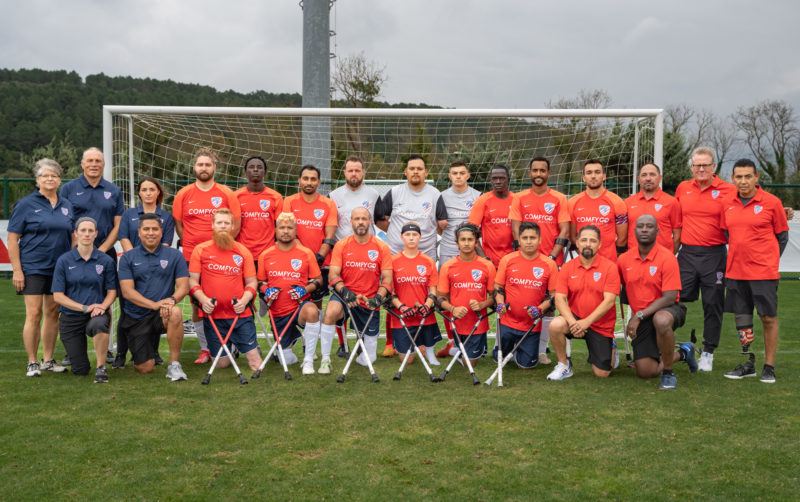
A love of soccer brought Emily Maxwell ’17, ’21 DPT to the University of Lynchburg. Two degrees and many trophies later, the physical therapist has found a way to combine the sport with her passion for service.
Maxwell already had close ties to the University. Her mother is a Lynchburg College alumna and a former field hockey and softball player for the Hornets. Her family also had a lakehouse on nearby Smith Mountain Lake, so Maxwell made frequent trips to Lynchburg as a child.
Being familiar with her mother’s and uncle’s small, tight-knit alma mater helped Maxwell narrow down her college options after graduating from high school in Quantico, Virginia.
Dr. Todd Olsen, head coach of the women’s soccer team, recruited Maxwell, and the future superstar quickly saw all Lynchburg had to offer.
“You can tell that people enjoy being there … It’s a program that attracts you,” Maxwell said.
She was looking for a place to play soccer, but she also wanted a place that would set her up for success after graduation. Maxwell, who majored in exercise physiology, was immediately attracted to the soccer program’s involvement in local and global outreach. Olsen brings his team across the world, making service a central pillar of his successful program.
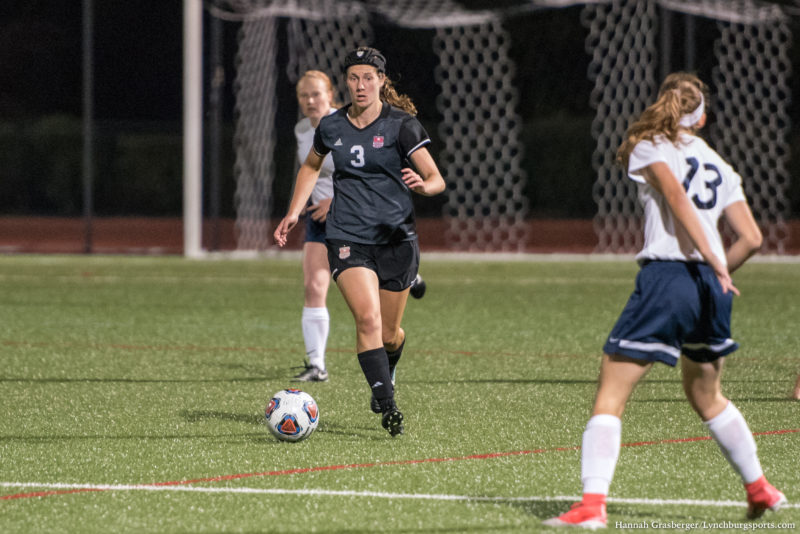
During her playing days at Lynchburg, Maxwell experienced tremendous success, including scoring seemingly countless postseason awards. The Old Dominion Athletic Conference named her player of the year twice. And, when the Hornets won the women’s soccer national championship in 2014, she earned the tournament’s most outstanding defensive player award. She was also a three-time All-American women’s soccer player.
Off the field, Maxwell and the team went on trips to Africa and Costa Rica, where they worked with communities on public health education. They also collaborated with Women of Worth to encourage female empowerment through sport.
On those trips, Maxwell learned how “soccer connects people across culture, ages, and genders,” she said. She saw how soccer can help develop a personal connection with others, even if one’s opponent doesn’t speak the same language or share the same background. She learned to appreciate the value of helping others through sports and realized how lucky she was to have soccer as a foundation in her own life.
“I strive to help others have the same accessibility to the game because I know how much it has changed my life,” she said.
That mentality carried over into pursuing a Doctor of Physical Therapy degree at Lynchburg, where her professors focused on developing interpersonal relationships with patients and on finding the “why” behind each person’s needs.
“PT school was about more than just physical therapy,” Maxwell said. “It was about creating outreach and a connection to the community.”
Shortly before graduating with her DPT in Spring 2021, Maxwell saw a social media post from Nico Calabria, captain of the U.S. Amputee Soccer team, calling for assistance growing the regional program in Massachusetts.
Even though she was over 600 miles away and not sure what exactly Calabria and the American Amputee Soccer Association were looking for, Maxwell wanted to get involved. It was the perfect opportunity to kick-start her career and stay connected with the game she’d been so passionate about her entire life.
Her conversations with Calabria online quickly got her in touch with Dr. James Pierre-Glaude, the director of sports medicine with the U.S. Amputee Soccer team.
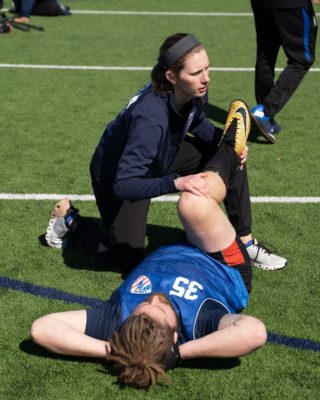
in Houston, Texas. Photo by Nigel Degraff.
Pierre-Glaude invited Maxwell to Boston in the spring of 2021 to help out at a national training camp. Maxwell dove head-first into working with the amputee team’s players.
“She definitely stood out, always took initiative and asked how she could help,” Pierre-Glaude said.
When the camp ended and everyone went their separate ways, Maxwell kept in touch. She also kept honing her sports medicine skills through classes and conversations with Pierre-Glaude.
When she landed a job in Massachusetts as a physical therapist, Maxwell was able to keep working with the team nearby. Soon after, Pierre-Glaude invited her to Mexico for the World Cup qualifiers.
He noticed her work ethic at the national training camps and knew she needed to be a part of the team.
“She’s an extension of me,” he said, adding that many players prefer to work with Maxwell for recovery sessions — despite Pierre-Glaude’s involvement with the team for over eight years.
Maxwell is in charge of the team’s warmup and cooldown routines during training sessions and at matches, and she assists with the preparation and recovery of the athletes.
“I think she thrives because she is so easy to work with,” Pierre-Glaude said. “She has no ego. She is very selfless.”
It’s pretty simple for Maxwell. “There’s something that connects all of us to the sport,” she said. Working with the amputee soccer team, she’s able to stay involved with the sport while serving others and connecting with them through soccer — just like she did at Lynchburg.
Her extensive work with the team is completely voluntary. She’s not being paid when she travels to Mexico or the 2022 World Cup in Turkey. But it’s not about money for her.
“I get the chance to represent the U.S. and disability sports across the globe,” Maxwell said. “It was an amazing experience to be able to connect over a shared dream and goal of being at the World Cup.”
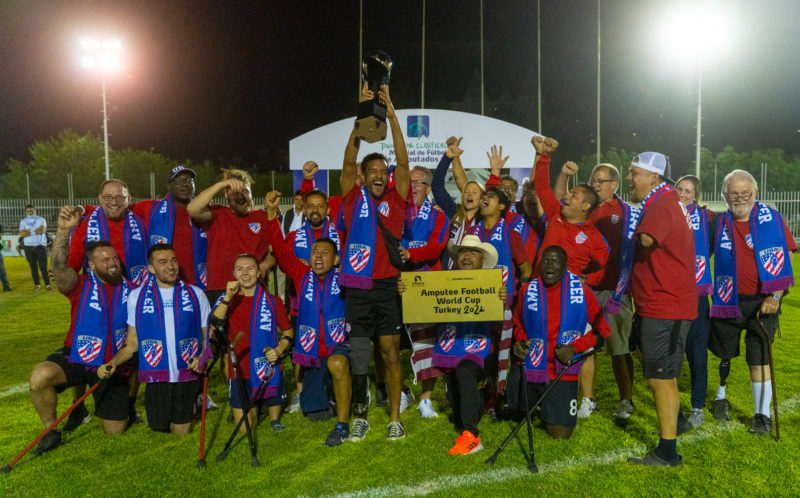
Like most soccer players, Maxwell always dreamed of representing her country at the World Cup. And while she wasn’t playing on the biggest stage, she could still live out her dream at the Amputee Soccer World Cup.
“You have to be flexible with your dreams and goals,” she said.
Maxwell continued her role leading the warmup and recovery programs for the players in Turkey in October. When working with people with limb differences, she applies a more global approach to regimenting their routines.
Unlike able-bodied soccer players, amputee soccer is played on forearm crutches. Upper-body injuries are more common in amputee soccer. Also, all the strain is put on one leg. Maxwell has tailored her programs to care for these differences, keeping the players healthy and ready to compete at the highest level.
“These players are extremely skilled, competitive, and dedicated athletes playing an incredibly physical game, which draws people to amputee soccer,” Maxwell said.
While her focus is on preventing upper extremity and trunk injuries, Maxwell is careful to adapt movements to each individual and their type of amputation or limb difference. And just like she was taught at Lynchburg, she connects with each player on a personal level.
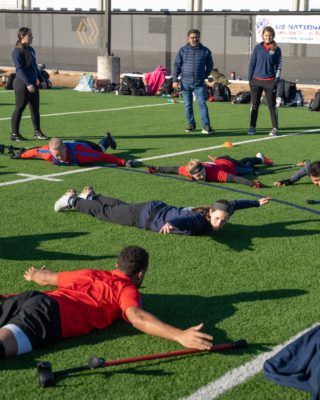
“She respects every single athlete as a soccer player. Not as amputees or as a charity case,” Pierre-Glaude said. “She treats them as any other elite athlete. Players appreciate that.”
The U.S. team finished 15th in a field of 24 at the World Cup, going up against the top teams. It’s a promising result, given that amputee soccer wasn’t introduced to the U.S. until 1980, while many other countries have a much longer history with the sport.
In Turkey, Maxwell and the team saw the support amputee soccer has internationally, spanning billboards and Turkey’s 30-team league with 600 registered, professional amputee players. England’s amputee soccer league has an affiliation with the Premier League clubs.
“We’re headed in that direction [in the U.S.], and it’s exciting,” Maxwell said.
The New England Revolution in the Major Soccer League has ties with the regional U.S. amputee team in Massachusetts, and Kelly Acosta, a player in the MLS and on the U.S. men’s national team, serves as an ambassador for the American Amputee Soccer Association.
Maxwell has moved back to Virginia, where she works as a physical therapist, and hopes to assist in the creation of a mid-Atlantic regional amputee soccer team. She believes her work will translate into a coaching career one day — maybe even with the U.S. Amputee Soccer team.
“You never know how your dream will shake out, but I’m glad to have the opportunity to represent the U.S. and see the game through a different lens as a medical professional,” she said.

